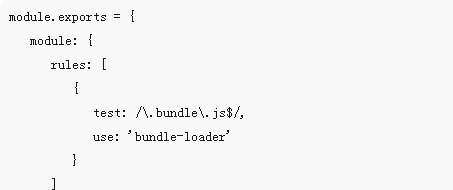
- 0133技术站
- 联系QQ:18840023
- QQ交流群

- 微信公众号



Webpack的捆绑加载程序
npm i bundle-loader --save
webpack.config.js
module.exports = {
module: {
rules: [
{
test: /\.bundle\.js$/,
use: 'bundle-loader'
}
]
}
}The chunk is requested, when you require the bundle.
file.js
import bundle from './file.bundle.js';
To wait until the chunk is available (and get the exports) you need to async wait for it.
bundle((file) => {
// use the file like it was required
const file = require('./file.js')
});This wraps the require('file.js') in a require.ensure block
Multiple callbacks can be added. They will be executed in the order of addition.
bundle(callbackTwo) bundle(callbackThree)
If a callback is added after dependencies were loaded, it will be called immediately.
| Name | Type | Default | Description |
|---|---|---|---|
lazy | {Boolean} | false | Loads the imported bundle asynchronously |
name | {String} | [id].[name] | Configure a custom filename for your imported bundle |
The file is requested when you require the bundle-loader. If you want it to request it lazy, use:
webpack.config.js
{
loader: 'bundle-loader',
options: {
lazy: true
}
}import bundle from './file.bundle.js'bundle((file) => {...})ℹ️ The chunk is not requested until you call the load function
nameYou may set name for a bundle using the name options parameter.
See documentation.
webpack.config.js
{
loader: 'bundle-loader',
options: {
name: '[name]'
}
}:warning: chunks created by the loader will be named according to the
output.chunkFilenamerule, which defaults to[id].[name]. Here[name]corresponds to the chunk name set in thenameoptions parameter.
import bundle from './file.bundle.js'
webpack.config.js
module.exports = {
entry: {
index: './App.js'
},
output: {
path: path.resolve(__dirname, 'dest'),
filename: '[name].js', // or whatever other format you want
chunkFilename: '[name].[id].js',
},
module: {
rules: [
{
test: /\.bundle\.js$/,
use: {
loader: 'bundle-loader',
options: {
name: 'my-chunk'
}
}
}
]
}
}Normal chunks will show up using the filename rule above, and be named according to their [chunkname].
Chunks from bundle-loader, however will load using the chunkFilename rule, so the example files will produce my-chunk.1.js and file-2.js respectively.
You can also use chunkFilename to add hash values to the filename, since putting [hash] in the bundle options parameter does not work correctly.
推荐手册